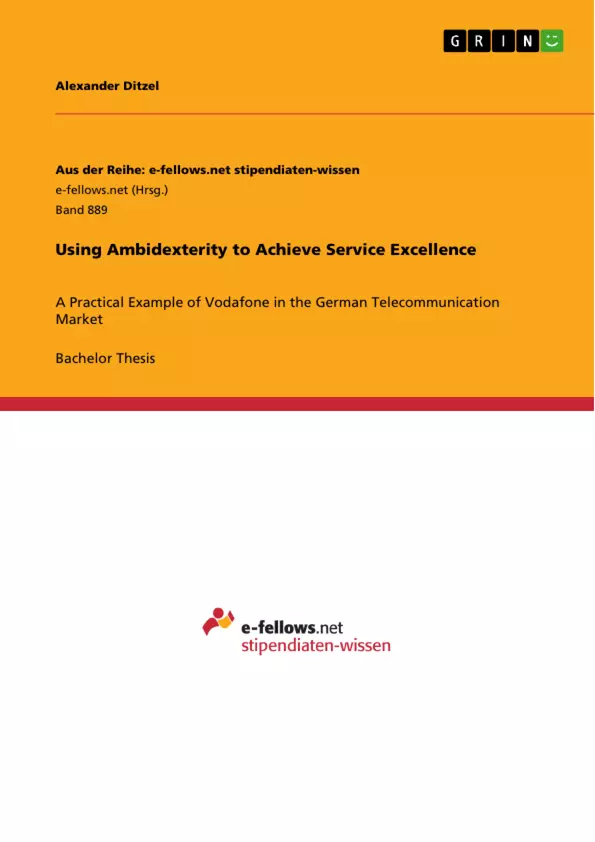In conjunction with the advancing process of globalization the competitive environment continually intensifies (Meyer, 2002, p. 3). The possibilities to minimize costs and to increase return on sales are mostly exhausted or require a high amount of effort to be realized (Kuhn & Hellingrath, 2002, p. 1). Market saturation in industrial nations caused a swift from seller to buyer markets (Meyer, 2002, p. 4), where the major challenge for service companies is based in the flexible and adaptable fulfillment of ascending demands and expectations of its customers (Gouthier, 2006, p. 58; Grant, 1996, p. 375). Delivering an outstanding and positively surprising service to the customer can lead to competitive advantages, such as a higher willingness to pay as the study by Homburg, Koschate, and Hoyer (2005) indicates, a higher loyalty if customers are very satisfied as “the Satisfaction-Loyalty Link” by Jones and Sasser (1995, p. 95) depicts, or a increased intention to recommend the services or products of a several provider (Mittal & Kamakura, 2001).
Thus, topics, such as service excellence gain importance, where companies appeal to continually improve and even perfect their service offer in order to achieve customer delight (Jonston, 2004, p. 129). Famous examples of companies that continuously strive for service excellence are Singapore Airlines and the Ritz Carlton hotels (Johnston, 2007, p. 23; Heracleous & Wirtz, 2010).
By watching classical advertisement in television or radio, several companies claim to deliver excellent service to their clients although in practical business life they fail. In order to implement service excellence, managers’ major issue is the combination of the apparently opposing forces of effectiveness and efficiency of their service. The view to be able to combine these two contrary forces contradicts Porter’s claim for differentiation and cost leadership (Porter, 1997). Nevertheless, Heracleous, Wirtz, and Johnston (2004) emphasize the necessity to find a balance between service effectiveness and service efficiency, and Bartlett, Ghoshal, and Birkinshaw (2004, pp. 405-406) describe a symbiotic process of rationalization and revitalization as crucial to succeed in a highly competitive environment.
The concept of organizational ambidexterity borrowed from organizational theory offers a response how to combine these two characteristics without neglecting one of them.
Inhaltsverzeichnis (Table of Contents)
- Introduction
- Problem Definition and Objectives
- Course of the Investigation
- Terms and Definitions
- Organizational Ambidexterity
- General Definition of Ambidexterity, Exploitation, and Exploration
- Classification of Ambidexterity
- Measuring Services
- Foundations of Measuring the Quality and Satisfaction of Services
- The Gap Model
- The SERVQUAL Model
- Customer Delight
- Service Excellence
- Service Efficiency and Service Effectiveness
- Ambidextrous Characteristics in Service Excellence
- Methodology
- Introduction of the German Telecommunication Market
- Introduction of Vodafone Germany
- Research Approach
- Outcomes
- Service Excellence at Vodafone
- Measuring Satisfied Customers at Vodafone – The Net Promoter Score
- Service Efficiency and Effectiveness at Vodafone
- Evaluation and Conclusion
Zielsetzung und Themenschwerpunkte (Objectives and Key Themes)
This thesis aims to examine how companies can achieve service excellence by utilizing ambidexterity, focusing on the example of Vodafone in the German telecommunications market.- The concept of organizational ambidexterity and its relevance to service excellence
- The measurement of service quality and customer satisfaction
- The importance of customer delight and its impact on competitive advantage
- Balancing service efficiency and service effectiveness to achieve sustainable service excellence
- The application of ambidexterity principles within Vodafone Germany
Zusammenfassung der Kapitel (Chapter Summaries)
- Introduction: This chapter introduces the research topic and defines the problem, outlining the objectives of the thesis. It highlights the increasing importance of service excellence in a competitive market.
- Terms and Definitions: This chapter provides a comprehensive overview of key concepts, including organizational ambidexterity, its various classifications, and different approaches to measuring service quality and customer satisfaction. It delves into the SERVQUAL model and the concept of customer delight.
- Methodology: This chapter describes the research methodology employed, including the context of the German telecommunications market and an introduction to Vodafone Germany. It also outlines the research approach used to gather and analyze data.
- Outcomes: This chapter presents findings regarding the application of ambidexterity principles at Vodafone Germany. It examines the company's approach to service excellence and discusses the use of metrics like the Net Promoter Score to measure customer satisfaction. It also analyzes Vodafone's strategies for achieving service efficiency and effectiveness.
Schlüsselwörter (Keywords)
The key terms and themes of this thesis include service excellence, organizational ambidexterity, customer delight, service efficiency, service effectiveness, customer satisfaction, the SERVQUAL model, the Net Promoter Score, and the German telecommunications market. These concepts form the basis for analyzing Vodafone's approach to achieving service excellence through a balanced application of exploitation and exploration activities.Frequently Asked Questions
What is organizational ambidexterity in services?
It is the ability of a company to balance two opposing forces: exploitation (efficiency and consistency) and exploration (innovation and flexibility).
How does ambidexterity help achieve service excellence?
By combining efficiency (low cost/speed) with effectiveness (high quality/delight), companies can deliver superior value that leads to competitive advantage.
What is the difference between customer satisfaction and customer delight?
Satisfaction is meeting expectations, while delight is positively surprising the customer by exceeding expectations, often leading to higher loyalty.
What is the SERVQUAL model?
SERVQUAL is a multi-dimensional research instrument designed to capture consumer expectations and perceptions of service quality across five dimensions.
How does Vodafone Germany use the Net Promoter Score (NPS)?
Vodafone uses the NPS to measure customer loyalty and the likelihood of recommendation, serving as a key metric for evaluating service excellence.
- Citar trabajo
- Alexander Ditzel (Autor), 2011, Using Ambidexterity to Achieve Service Excellence, Múnich, GRIN Verlag, https://www.grin.com/document/267962



